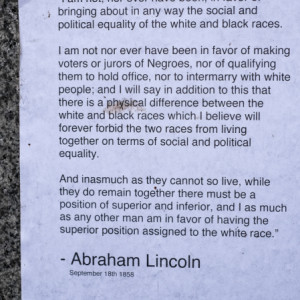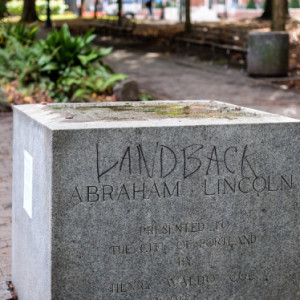Indigenous People's Day
Last night a group of protesters brought down statues of Abraham Lincoln and Theodore Roosevelt that stood downtown across from the Portland Art Museum, "demanding that the video live-streamers and photographers who had become staples of such events stay away." That's because photographs and videos are being used by the Federal Government to identify protesters and prosecute them. This is one reason why I no longer photograph protests. The other is Covid-19.
These two young men who had nothing to do with the protest were downtown this afternoon, happy to be photographed enjoying the empty pedestal where a bronze Theodore Roosevelt once stood. Roosevelt enthusiastically embraced lying to Native People, violating treaties signed with them, and encouraging their massacres. As extras I'm posting the empty pedestal for Lincoln, to the side of which is wheat-pasted a statement Lincoln made in 1858, which says in part, "I am not, nor ever have been, in favor of bringing about in any way the social and political equality of the white and black races." We really need to completely re-write American history, a project the current administration opposes, needless to say.
I am grateful for celebration of my 2500th Blip. I attempted to respond to each comment by leaving a comment on the journal of the person who wrote it, rather than in the long column of comments on my journal. I don't feel I deserve all that attention, but thank you.
Update: Kd in a comment below posted this brilliant explanation by Heather Cox Richardson. It is eloquent on this issue: "Here's the story: historians are not denigrating the nation when they uncover sordid parts of our past. Historians study how and why societies change. As we dig into the past we see patterns that never entirely foreshadow the present, but that give us ideas about how people have dealt with circumstances in the past that look similar to circumstances today. With luck, seeing those patterns will help us make better decisions about our own lives, our communities, and our nation in the present. As they say, history doesn’t repeat itself, but it often rhymes.
If we are going to get an accurate picture of how a society works, historians must examine it honestly. That means seeing the bad as well as the good, because, after all, any human society is going to have both. Sometimes good human actions change society; sometimes bad ones do. George Washington’s heroic refusal to be a king is no truer than his enslavement of other human beings, and both changed our nation in ways that we need to understand if we are to make good decisions about how to take care of our own society.
History, though, is different than commemoration. History is about what happened in the past while commemoration is about the present. We put up statues and celebrate holidays to honor figures from the past who embody some quality we admire. But as society changes, the qualities we care about shift. In the 1920s, Columbus mattered to Americans who opposed the Ku Klux Klan because he represented a multicultural society. Now, though, he represents the devastation of America’s indigenous people at the hands of European colonists who brought to North America and South America germs and a fever for gold and God. It is not “radical activism” to want to commemorate a different set of values than we held in the 1920s.
What is radical activism, though, is the attempt to skew history to serve a modern-day political narrative. Rejecting an honest account of the past makes it impossible to see accurate patterns. The lessons we learn about how society changes will be false, and the decisions we make based on those false patterns will not be grounded in reality.
And a nation grounded in fiction, rather than reality, cannot function."



Comments
Sign in or get an account to comment.


